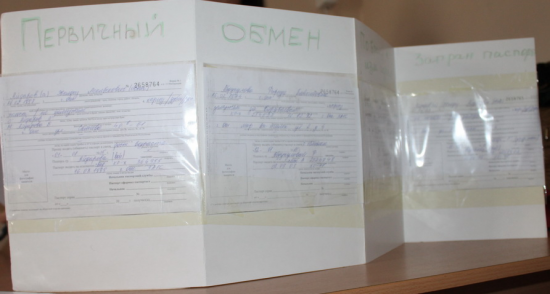
Imagine that a single document granted you the right to use social benefits like schooling and healthcare and was needed to vote, to get a working permit, a pension or an alimony for your child. Then imagine that you never had that document.
This is the reality for the “invisible” people in Kyrgyzstan.
“Invisible” people are people who never had proper identification like passport (ID-card) and birth certificates. Because of this, they do not exist in for the public system and they therefore cannot exert their rights as citizens.
Even though these people are invisible for the public system, our partner, Public Foundation “Legal Clinic “Adilet”, recognises the problems they face. One of the biggest tasks for Adilet is to help these people gain visibility by providing free legal services.
“One of the main reasons why people remain invisible is that they are simply unaware of the rules. Even though it is the responsibility of the government to inform people, people are uninformed and do not know that documentation and registration is important” Gairat Atavaliev, lawyer at Adilet, explains.
Too poor to fight bureaucracy
The people who are “invisible” are very vulnerable and among the poorest in the country. They are preoccupied with their basic needs – earning enough money to provide food and housing for themselves and their children. This means that working their way through bureaucracy is the last thing on their list, especially since they do not know the benefits this can give to their families.
Furthermore, many of these people also give birth at home for a number of reasons – maybe there is no birth clinic in their area or maybe they cannot afford to go. But if they give birth at home, their children seldom get a birth certificate. And that makes the child “invisible”.
“Also, new-born children cannot get birth certificates unless their parents have ID-cards. This creates several generations of invisibility. And the more “invisible” generations, the documents become more and more difficult to restore. Today for example, we have a case of appeal with a family who has no identity documents for three generations ” Gairat Atavaliev comments.
Finally, people are afraid to contact the authorities themselves. This is because the fear and scepticism towards authorities that the Soviet system installed in people is still alive and thriving. Many try to avoid the system as much as possible in fear of what consequences it might bring.
A vicious cycle from the Soviet past
One of the forms of documentation that gives the most difficulties is the residence permit, the so-called propiska. It is a leftover from the Soviet Union, where everybody were tied to a particular place through the system of registration. This put all forms of migration under harsh control. By now, with a significant part of the Kyrgyz population being internal migrants, propiska complicates many people’s lives.
Propiska and identification is tied very closely together. If you want to get a passport, you will need to have a propiska, which you can only get, if you own your own house or get a permission from your letter of house to register there. Of course, for poor people, owning a house is not an option, and more often than not, landlords will not allow this, because they are afraid of taxation.
This is yet another reason why many people remain invisible.
“It’s a vicious cycle where poor families remain poor for generations” Gairat says.
“Adilet” means justice
This is where Adilet comes in, helping both with issues of identity documents and propiska. Since the project start, Adilet has provided legal services to more than 200 people. 49 of these cases needed to be presented in court, and for today 23 of them were won.
“The legal process can be dragging and mentally exhausting. Sometimes it can take up to two years depending on the available documentation” lawyer says.
Other cases are solved faster, but the still leave quite an impression.
Apart from helping people with their personal, legal problems, Adilet also tries to address the more structural causes of the problems. Among other initiatives, they are conducting trainings and capacity building of the national State Registration Service, and they have co-written a new draft law in which identification is made simpler and not tied up to propiska.
“What we try to do is to be a bridge between the people and the government, so that the government understands people’s problems” Gairat Atavaliev states.
Since March 2014, Adilet has helped 184 people obtain documentation.
By Sarah Louise Kriesz, intern at DCA in Kyrgyzstan by the support of Cholpon Babalieva, PR specialist of PF “Legal Clinic “Adilet”